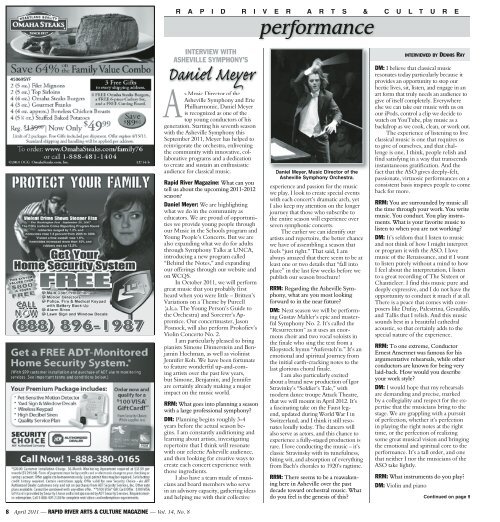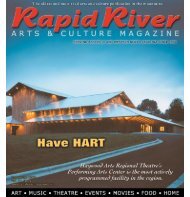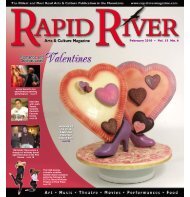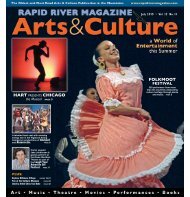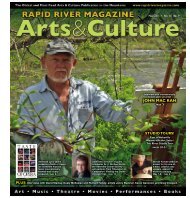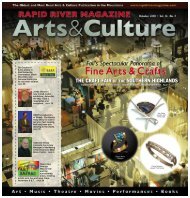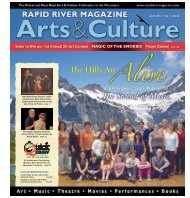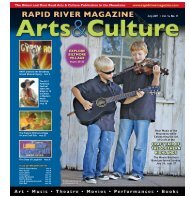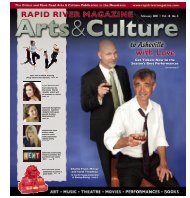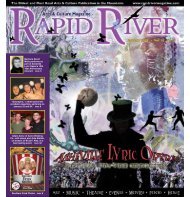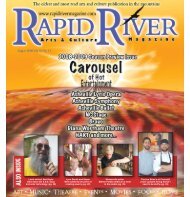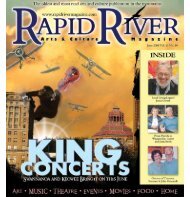JONAS GERARD - Rapid River Magazine
JONAS GERARD - Rapid River Magazine
JONAS GERARD - Rapid River Magazine
You also want an ePaper? Increase the reach of your titles
YUMPU automatically turns print PDFs into web optimized ePapers that Google loves.
R A P I D R I V E R A R T S & C U L T U R E<br />
performance<br />
8 April 2011 — RAPID RIVER ARTS & CULTURE MAGAZINE — Vol. 14, No. 8<br />
INTERVIEW WITH<br />
ASHEVILLE SYMPHONY’S<br />
Daniel Meyer<br />
A<br />
s Music Director of the<br />
Asheville Symphony and Erie<br />
Philharmonic, Daniel Meyer<br />
is recognized as one of the<br />
top young conductors of his<br />
generation. Starting his seventh season<br />
with the Asheville Symphony this<br />
September 2011, Meyer has helped to<br />
reinvigorate the orchestra, enlivening<br />
the community with innovative, collaborative<br />
programs and a dedication<br />
to create and sustain an enthusiastic<br />
audience for classical music.<br />
<strong>Rapid</strong> <strong>River</strong> <strong>Magazine</strong>: What can you<br />
tell us about the upcoming 2011-2012<br />
season?<br />
Daniel Meyer: We are highlighting<br />
what we do in the community as<br />
educators. We are proud of opportunities<br />
we provide young people through<br />
our Music in the Schools program and<br />
Young People’s Concerts. But we are<br />
also expanding what we do for adults<br />
through Symphony Talks at UNCA,<br />
introducing a new program called<br />
“Behind the Notes,” and expanding<br />
our offerings through our website and<br />
on WCQS.<br />
In October 2011, we will perform<br />
great music that you probably first<br />
heard when you were little – Britten’s<br />
Variations on a Theme by Purcell<br />
(a.k.a. The Young Person’s Guide to<br />
the Orchestra) and Sorcerer’s Apprentice.<br />
Our concertmaster, Jason<br />
Posnock, will also perform Prokofiev’s<br />
Violin Concerto No. 2.<br />
I am particularly pleased to bring<br />
pianists Simone Dinnerstein and Benjamin<br />
Hochman, as well as violinist<br />
Jennifer Koh. We have been fortunate<br />
to feature wonderful up-and-coming<br />
artists over the past few years,<br />
but Simone, Benjamin, and Jennifer<br />
are certainly already making a major<br />
impact on the music world.<br />
RRM: What goes into planning a season<br />
with a large professional symphony?<br />
DM: Planning begins roughly 3-4<br />
years before the actual season begins.<br />
I am constantly auditioning and<br />
learning about artists, investigating<br />
repertoire that I think will resonate<br />
with our eclectic Asheville audience,<br />
and then looking for creative ways to<br />
create each concert experience with<br />
those ingredients.<br />
I also have a team made of musicians<br />
and board members who serve<br />
in an advisory capacity, gathering ideas<br />
and helping me with their collective<br />
Daniel Meyer, Music Director of the<br />
Asheville Symphony Orchestra.<br />
experience and passion for the music<br />
we play. I look to create special events<br />
with each concert’s dramatic arch, yet<br />
I also keep my attention on the longer<br />
journey that those who subscribe to<br />
the entire season will experience over<br />
seven symphonic concerts.<br />
The earlier we can identify our<br />
artists and repertoire, the better chance<br />
we have of assembling a season that<br />
feels “just right.” That said, I am<br />
always amazed that there seem to be at<br />
least one or two details that “fall into<br />
place” in the last few weeks before we<br />
publish our season brochure!<br />
RRM: Regarding the Asheville Symphony,<br />
what are you most looking<br />
forward to in the near future?<br />
DM: Next season we will be performing<br />
Gustav Mahler’s epic and masterful<br />
Symphony No. 2. It’s called the<br />
“Resurrection” as it uses an enormous<br />
choir and two vocal soloists in<br />
the finale who sing the text from a<br />
Klopstock hymn “Aufersteh’n.” It’s an<br />
emotional and spiritual journey from<br />
the initial earth-cracking notes to the<br />
last glorious choral finale.<br />
I am also particularly excited<br />
about a brand new production of Igor<br />
Stravinky’s “Soldier’s Tale,” with<br />
modern dance troupe Attack Theatre,<br />
that we will mount in April 2012. It’s<br />
a fascinating take on the Faust legend,<br />
updated during World War I in<br />
Switzerland, and I think it still resonates<br />
loudly today. The dancers will<br />
also serve as actors, and this chance to<br />
experience a fully-staged production is<br />
rare. I love conducting the music – it’s<br />
classic Stravinsky with its tunefulness,<br />
biting wit, and absorption of everything<br />
from Bach’s chorales to 1920’s ragtime.<br />
RRM: There seems to be a reawakening<br />
here in Asheville over the past<br />
decade toward orchestral music. What<br />
do you feel is the genesis of this?<br />
INTERVIEWED BY DENNIS RAY<br />
DM: I believe that classical music<br />
resonates today particularly because it<br />
provides an opportunity to stop our<br />
hectic lives, sit, listen, and engage in an<br />
art form that truly needs an audience to<br />
give of itself completely. Everywhere<br />
else we can take our music with us on<br />
our iPods, control a clip we decide to<br />
watch on YouTube, play music as a<br />
backdrop as we cook, clean, or work out.<br />
The experience of listening to live<br />
classical music is one that requires us<br />
to give of ourselves, and that challenge<br />
is one, I think, people relish and<br />
find satisfying in a way that transcends<br />
instantaneous gratification. And the<br />
fact that the ASO gives deeply-felt,<br />
passionate, virtuosic performances on a<br />
consistent basis inspires people to come<br />
back for more.<br />
RRM: You are surrounded by music all<br />
the time through your work. You write<br />
music. You conduct. You play instruments.<br />
What is your favorite music to<br />
listen to when you are not working?<br />
DM: It’s seldom that I listen to music<br />
and not think of how I might interpret<br />
or program it with the ASO. I love<br />
music of the Renaissance, and if I want<br />
to listen purely without a mind to how<br />
I feel about the interpretation, I listen<br />
to a great recording of The Sixteen or<br />
Chanticleer. I find this music pure and<br />
deeply expressive, and I do not have the<br />
opportunity to conduct it much if at all.<br />
There is a peace that comes with composers<br />
like Dufay, Palestrina, Gesualdo,<br />
and Tallis that I relish. And this music<br />
sounds best in a beautiful cathedral<br />
acoustic, so that certainly adds to the<br />
special nature of the experience.<br />
RRM: To one extreme, Conductor<br />
Ernest Ansermet was famous for his<br />
argumentative rehearsals, while other<br />
conductors are known for being very<br />
laid-back. How would you describe<br />
your work style?<br />
DM: I would hope that my rehearsals<br />
are demanding and precise, marked<br />
by a collegiality and respect for the expertise<br />
that the musicians bring to the<br />
stage. We are grappling with a pursuit<br />
of perfection, whether it’s perfection<br />
in playing the right notes at the right<br />
time, or the perfection of realizing<br />
some great musical vision and bringing<br />
the emotional and spiritual core to the<br />
performance. It’s a tall order, and one<br />
that neither I nor the musicians of the<br />
ASO take lightly.<br />
RRM: What instruments do you play?<br />
DM: Violin and piano.<br />
Continued on page 9


